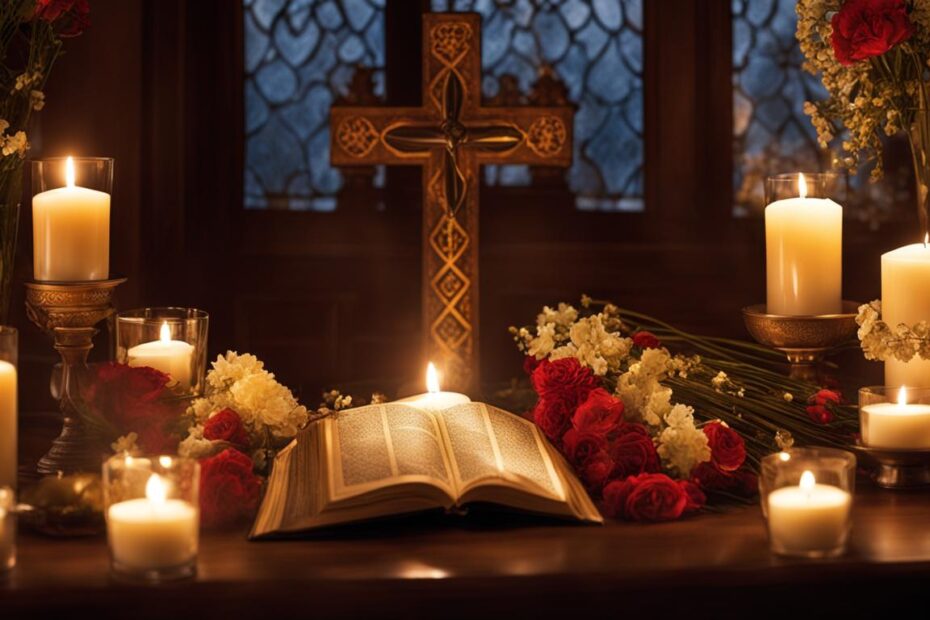In times of loss and grief, finding solace and comfort is essential. Traditional prayers for the dying offer a source of strength and hope for both the individual nearing the end of life and their loved ones. These prayers, deeply rooted in the Christian faith, provide a sense of peace and reassurance during this challenging time.
The power of prayer cannot be understated when it comes to providing support and comfort. Whether recited with the dying person or offered after their passing, these prayers have a profound impact on the spiritual journey of the individual and those who mourn their loss.
Throughout this article, we will explore the significance of traditional prayers for the dying, offering insights into the prayers that can be recited during the transition from life to death, as well as prayers to ease the grieving process. By understanding the power of these prayers, we can find solace and strength in our faith.
Key Takeaways:
- Traditional prayers for the dying provide comfort and solace during times of loss and grief.
- These prayers are deeply rooted in the Christian faith and offer a sense of peace and reassurance.
- Prayers can be recited with the dying person or offered after their passing.
- Prayers for the dying help navigate the spiritual journey and provide a source of strength and hope.
- Prayers for mourners offer comfort, certainty, and courage during the grieving process.
Prayers with the Dying
When accompanying a loved one in their final moments, offering prayers can provide solace and comfort for both the dying person and those present. These prayers can help create a peaceful atmosphere and allow for a deeper connection with God. Here are some powerful prayers that can be recited with the dying:
- “To you, O LORD, I lift up my soul”: This short text can be repeated as a mantra, focusing on surrendering the soul to God’s care and guidance.
- “Jesus, remember me when you come into your kingdom”: These words, spoken by the repentant thief on the cross, express a humble plea for mercy and the desire to be remembered in the eternal Kingdom.
In addition to these short texts, longer scripture readings can be shared with the dying person. The 23rd Psalm, with its comforting imagery of the Lord as a shepherd guiding and protecting, can bring peace and reassurance. The Prayer of Commendation, which commends the dying person to God’s mercy, can be recited as well, acknowledging their imminent journey into the arms of the Divine.
“Though I should walk in the valley of the shadow of death, no evil would I fear, for you are with me.”
By reciting these prayers, we invoke God’s presence and seek His peace for the dying individual. These words can provide a sense of comfort and assurance, reminding both the dying person and those present that they are not alone.
Prayers after Death
After the death of a loved one, prayers can be offered to ease the transition of the dying. These prayers serve as a way to entrust the deceased to God’s mercy and to request eternal rest for them. One such prayer is the Prayer for the Dead, which acknowledges the passing of the old order and welcomes the deceased into paradise, where there is no sorrow or pain. This prayer not only comforts the mourners but also affirms the belief in a peaceful afterlife.
Additionally, other prayers can be recited immediately after death and in the following hours. These prayers help provide solace and support to those who are grieving. They offer a way for mourners to find strength and find a sense of peace during this difficult time. These prayers can be personalized to reflect the unique relationship between the deceased and the mourner.

It’s important to note that these prayers are not only for the benefit of the deceased but also for the well-being of those who mourn. They provide a spiritual framework for processing grief and offer comfort and healing to those left behind. Through these prayers, mourners can find a sense of hope and support as they navigate the grieving process.
How to Use These Prayers
When it comes to using Christian prayers for the dying, there are several considerations to keep in mind. These prayers can be customized to fit the specific circumstances and condition of the person who is dying. Whether you are reciting Catholic prayers for the dying or spiritual prayers from another tradition, it’s important to create an environment of peace and reverence.
During the prayer session, it’s helpful to create moments of silence and invite everyone present to call to mind the presence of God. This can be done by dimming the lights, playing soft instrumental music, or simply sitting in a quiet room. The prayers should be said in a slow and quiet voice, alternating with periods of silence for reflection and meditation.
It’s worth noting that prayers can still be said even if the dying person appears to be unconscious. Studies have shown that individuals in a coma or vegetative state may still have some level of awareness of their surroundings. Therefore, the soothing words of prayer can bring comfort and solace to the dying person, even if they are unable to respond.
Remember that every person’s journey is unique, so prayers can be tailored to the individual’s needs. They can be shortened or extended as necessary, depending on the circumstances. The most important thing is to approach the prayerful moment with love, compassion, and a deep trust in God’s mercy.
Additional Considerations
- Ensure a peaceful and quiet environment for prayer.
- Customize the prayers to the individual’s needs and beliefs.
- Alternate between spoken prayers and moments of silence.
- Be attentive to the dying person’s body language and response.
- Remember that prayers can still be meaningful, even if the person appears unconscious.
“Prayer is not asking. It is a longing of the soul. It is daily admission of one’s weakness. It is better in prayer to have a heart without words than words without a heart.” – Mahatma Gandhi
Prayers for Mourners
Mourning the death of a loved one is a challenging and emotional experience. During this time of sadness and doubt, prayers can provide solace, comfort, and a sense of hope. These prayers are offered to those who are grieving, seeking to ease the transition of the dying and find peace in the midst of sorrow.
“May the love and mercy of God embrace you and bring you consolation in your time of mourning. May you find comfort in the memories you shared with your loved one and find solace in the knowledge that they are at peace in the eternal Kingdom,” prays Father Michael, a priest.
“Grief never ends, but it changes. It’s a passage, not a place to stay. Grief is not a sign of weakness, nor a lack of faith. It is the price of love.” – Unknown
These prayers seek to bring comfort, certainty, and courage to mourners. They acknowledge the pain and struggle of the grieving process while also offering hope for a future reunion with their loved one. Through prayers, mourners can find strength to navigate through their grief and embrace the healing power of faith.
Table: Prayers for Mourners
| Prayer | Description |
|---|---|
| Prayer for Comfort | A prayer that asks for God’s comforting presence during times of grief and mourning. |
| Prayer for Strength | A prayer that seeks strength and courage for the mourners to face their loss and continue on their journey. |
| Prayer for Hope | A prayer that expresses hope for a future reunion with the deceased in the eternal Kingdom. |
| Prayer for Peace | A prayer that asks for inner peace and tranquility amidst the pain and turmoil of grief. |
| Prayer for Healing | A prayer that seeks healing for the wounded hearts of mourners, bringing them comfort and restoration. |
These prayers are meant to provide support and comfort to those who are mourning, reminding them that they are not alone in their grief. They offer a pathway to healing, helping mourners find peace and strength as they navigate through their grief journey.

Conclusion
The Catholic tradition offers a rich collection of prayers for the dying and for those who mourn. These prayers provide comfort, solace, and a sense of hope during times of grief. Whether recited with the dying person or offered after death, these prayers help the faithful navigate the journey of life and death with faith, love, and trust in God’s mercy.
Through the power of Catholic prayers for a peaceful death, individuals can find solace and peace in their final moments. These spiritual prayers for the dying offer a connection to the divine and a source of strength during the transition from life to eternal rest. By embracing these prayers, individuals can find comfort and serenity, knowing that they are not alone on this journey.
It is in times of profound loss and sadness that Catholic prayers for the dying provide a beacon of hope. These prayers offer a way to express grief, seek guidance, and find strength as mourners navigate their emotions. By turning to these prayers, individuals can find comfort and assurance, knowing that their loved ones are held in God’s eternal embrace, and that one day, there will be a joyous reunion in the eternal Kingdom.
FAQ
What are traditional prayers for the dying?
Traditional prayers for the dying include reciting prayers such as the Our Father, Hail Mary, Glory Be, as well as short texts like “Though I should walk in the valley of the shadow of death, no evil would I fear, for you are with me.”
What prayers can be recited with the dying person?
Prayers to be recited with the dying person include short texts such as “To you, O LORD, I lift up my soul” and “Jesus, remember me when you come into your kingdom.” Longer scripture readings can also be shared, such as the 23rd Psalm. The Prayer of Commendation can be said as well.
Can prayers be offered after the death of a loved one?
Yes, prayers can be offered after the death of a loved one. A Prayer for the Dead can be recited, entrusting the deceased to God’s mercy and requesting eternal rest for them. Additional prayers can be recited immediately after death and in the following hours.
How can prayers be customized for the dying person?
Prayers can be customized to fit the specific circumstances and condition of the person who is dying. They can be shortened or extended as needed. It’s important to create moments of silence and invite everyone to call to mind the presence of God. The prayers should be said in a slow and quiet voice, alternating with periods of silence.
What prayers can be offered for those mourning the death of a loved one?
Prayers can be offered for those mourning the death of a loved one, asking for comfort, certainty, and courage during a time of sadness and doubt. The prayers also express hope for a future reunion in the eternal Kingdom.
How can these prayers be used?
These prayers can be used as Christian prayers for the dying, Catholic prayers for the dying, and spiritual prayers for the dying. They offer comfort, solace, and a sense of hope during times of grief and can be recited with the dying person or offered after death.
What is the significance of these prayers?
Catholic prayers for the dying, prayers for a peaceful death, and spiritual prayers for the dying provide comfort, solace, and help the faithful navigate the journey of life and death with faith, love, and trust in God’s mercy.








